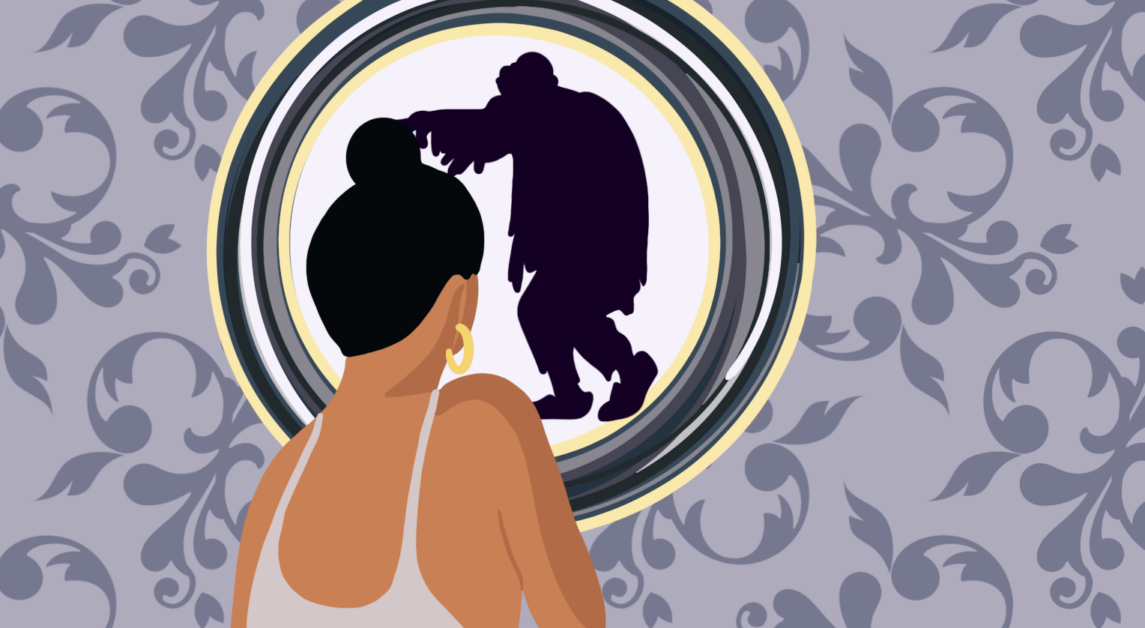Every year, I promise myself that I’m going to plan my costumes early—and this year, I finally followed through. I ordered everything ahead of time and couldn’t wait to sprint home from the mailroom, tear open the packages, and try everything on. Unfortunately, that excitement was short-lived. Most of what I bought didn’t fit me right, and I ended up having to ad-lib my costumes quite a bit—just like I had to do every year beforehand.
I wasn’t necessarily upset that I wouldn’t be able to wear my original costumes. Rather, when I tried them on, I hated the way I looked. I’m sure everyone has experienced this feeling at some point. You grab a pair of jeans off the rack and then spend a minute in the fitting room collecting yourself because they managed to highlight every insecurity you have.
This kind of shame about one’s body often starts with anger and ends with sadness. Maybe a dress is really cute, but only because it’s on the model—it wouldn’t look like that on me. God forbid you walk into a Lululemon and pick out your usual size, only to feel like a sausage trying to fit yourself into compression leggings made for a toddler.
Sometimes it feels like I’m being weighed down by the body I’m in. Sometimes I find myself wishing I could just unzip this mass of flesh and blood I’m trapped in and step out of me for a minute, just to catch my breath. Sometimes I feel as if I’m a villain in Scooby-Doo, and all day long I walk around in this ridiculous get-up that is the physical “me.” Sometimes I’ll head to class or work out at the gym and I’ll feel this intense sensation of being “less-than.” Sometimes I can’t wait to go home so I can hang my appearance by the door like a rain jacket and hide in the darkest corner of my room.
I don’t struggle with these intense feelings at every moment—but when I let them go unchecked, I sense a darkness growing inside of me. I feel as if I’m embodying the definition of the word comparison: the thief of joy. I might go about my day quietly interrogating myself: Why don’t I measure up to the girls I see around me? Why can’t I have perfect hair like the poor girl who made the mistake of sitting near me in the library? She hasn’t a clue, but I’m tearing both of us down in my head. Neither of us deserve that.
There’s a fair amount of talk today about body positivity, self-improvement, and combatting unhealthy workout and diet culture. At the same time, I also think there’s a lot of fear to admit that sometimes we do feel self-judgemental—even to our closest friends. I personally feel a great amount of vulnerability publishing my name above a column that admits to the things I’d rather take to the grave. There’s shame in confessing that you’ve succumbed to the voices in your head telling you that you’re not enough. That you lost in a battle against photoshopped Instagram models and diet sodas.
You can dance around these subjects, but if you say things too plainly—too honestly—suddenly you’ve said too much. And no one likes a girl who doesn’t like herself. When we talk about unhealthy habits or mindsets, we often tend to distance ourselves from them. For example, it’s okay to say that you used to get anxious when you went to the gym, but it’s not okay to say that you’re eating a salad for lunch because calories have become a problem again.
Sometimes it’s easiest to speak in tongues when talking about how we feel about ourselves or our self-image—to say things without really saying them. By doing this, we can look at each other with warmth and understanding without feeling like we’re incriminating ourselves.
Then again, I’ve never really been a person who’s understood the concept of “just because we’re all thinking it, doesn’t mean you have to say it.” If we’re all thinking about it, why not say it?
Part of the issue in admitting to feelings of body shame is that these thoughts are often irrational and ridiculous. Your feelings are always valid, but to say out loud that you have a fear of bread or a fear of mirrors does sound a bit silly. Imagine saying that to a classroom full of first graders! They’d laugh at you. Imagine saying it to your first-grade self—she’d be confused, too.
When you say these things out loud, you force them to stand on their own in the light. Suddenly, the monsters under your bed turn out to only be shadows.
There was a part of me this Halloween that was hoping that if I found the right costume, I could pretend to be someone who didn’t feel any judgment about my looks or the looks of others. It took me some time to identify this feeling, a bit more time to say it out loud, and even longer to have the courage to write about it in a column. But I hope that this helps someone, as it has helped me.
I don’t think there’s a single person on this planet immune to body insecurity. The way you might be feeling is not novel. You are not alone, and you will not feel this way forever. I promise.













